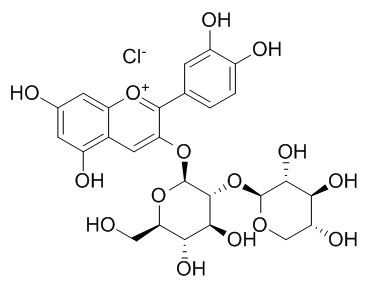Cyanidin-3-O-sambubioside chloride
Cyanidin-3-O-sambubioside chloride is inhibitors of BPDE-induced NFκB activity. It inhibits the enzyme activity by competing with the substrate for the active site. Cyanidin-3-O-sambubioside chloride has antioxidant activity and free-radical-scavenging property.
Inquire / Order:
manager@chemfaces.com
Technical Inquiries:
service@chemfaces.com
Tel:
+86-27-84237783
Fax:
+86-27-84254680
Address:
1 Building, No. 83, CheCheng Rd., Wuhan Economic and Technological Development Zone, Wuhan, Hubei 430056, PRC
Providing storage is as stated on the product vial and the vial is kept tightly sealed, the product can be stored for up to
24 months(2-8C).
Wherever possible, you should prepare and use solutions on the same day. However, if you need to make up stock solutions in advance, we recommend that you store the solution as aliquots in tightly sealed vials at -20C. Generally, these will be useable for up to two weeks. Before use, and prior to opening the vial we recommend that you allow your product to equilibrate to room temperature for at least 1 hour.
Need more advice on solubility, usage and handling? Please email to: service@chemfaces.com
The packaging of the product may have turned upside down during transportation, resulting in the natural compounds adhering to the neck or cap of the vial. take the vial out of its packaging and gently shake to let the compounds fall to the bottom of the vial. for liquid products, centrifuge at 200-500 RPM to gather the liquid at the bottom of the vial. try to avoid loss or contamination during handling.
Int J Mol Sci.2023, 24(24):17589.
Int. J. Mol. Sci.2022, 23(8), 4130.
Oncol Rep.2016, 35(3):1356-64
Antioxidants (Basel).2023, 12(1):189.
Int J Mol Sci.2024, 25(22):12152.
Biochem Biophys Res Commun.2020, 522(4):1052-1058
J Ethnopharmacol.2019, 235:406-414
Molecules.2023, 28(13):4972.
Int J Mol Sci.2015, 16(1):1232-51
British Jou. Med.&Med. Research2014, 1802-1811
Related and Featured Products
J Biomol Struct Dyn . 2018 Dec;36(16):4255-4269.
The inhibitory performance of flavonoid cyanidin-3-sambubiocide against H274Y mutation in H1N1 influenza virus[Pubmed:
29199545]
Abstract
Oseltamivir (Tamiflu) is the most accepted antiviral drug that targets the neuraminidase (NA) protein to inhibit the viral release from the host cell. Few H1N1 influenza strains with the H274Y mutation creates drug resistance to oseltamivir. In this study, we report that flavonoid cyanidin-3-sambubiocide (C3S) compound acts as a potential inhibitor against H274Y mutation. The drug resistance mechanism and inhibitory activity of C3S and oseltamivir against wild-type (WT) and H274Y mutant-type (MT) have been studied and compared based on the results of molecular docking, molecular dynamics, and quantum chemical methods. Oseltamivir has been found less binding affinity with MT. C3S has more binding affinity with WT and MT proteins. From the dynamical study, the 150th loop of the MT protein has found more deformation than WT. A single H274Y mutation induces the conformational changes in the 150th loop which leads to produce more resistance to oseltamivir. The 150th cavity is more attractive target for C3S to stop the conformational changes in the MT, than 430th cavity of NA protein. The C3S is stabilized with MT by more number of hydrogen bonds than oseltamivir. The electrostatic interaction energy shows a stronger C3S binding with MT and this compound may be more effective against oseltamivir-resistant virus strains.
Keywords: H274Y mutation; Influenza virus; drug resistance; molecular docking; molecular dynamic simulation.
Planta Med . 2013 Nov;79(17):1636-40.
Cyanidin-3-O-sambubioside from Acanthopanax sessiliflorus fruit inhibits metastasis by downregulating MMP-9 in breast cancer cells MDA-MB-231[Pubmed:
24214832]
Abstract
Anthocyanins play an important role in physiological functions related to human health. This study aimed to investigate the inhibitory effect of cyanidin-3-O-sambubioside isolated from Acanthopanax sessiliflorus fruit on cancer cell metastasis. The inhibitory effect of cyanidin-3-O-sambubioside on angiogenesis was assessed by chorioallantoic membrane and tube formation assays. Cyanidin-3-O-sambubioside interrupted the formation of neovasculature and tube-like structures in a dose-dependent manner. It inhibited the wound healing migration and invasion of MDA-MB-231 cells through reconstituted extracellular matrix (Matrigel). Gelatin zymography revealed that cyanidin-3-O-sambubioside significantly decreased the secretion of matrix metalloproteinase-9 and inhibited matrix metalloproteinase-9 expression. In additional, cyanidin-3-O-sambubioside exerted an inhibitory effect on Akt phosphorylation. These results suggest that cyanidin-3-O-sambubioside inhibits metastasis processes, such as angiogenesis and invasion, in breast cancer cells through regulation of matrix metalloproteinase-9 activity.
Georg Thieme Verlag KG Stuttgart · New York.



